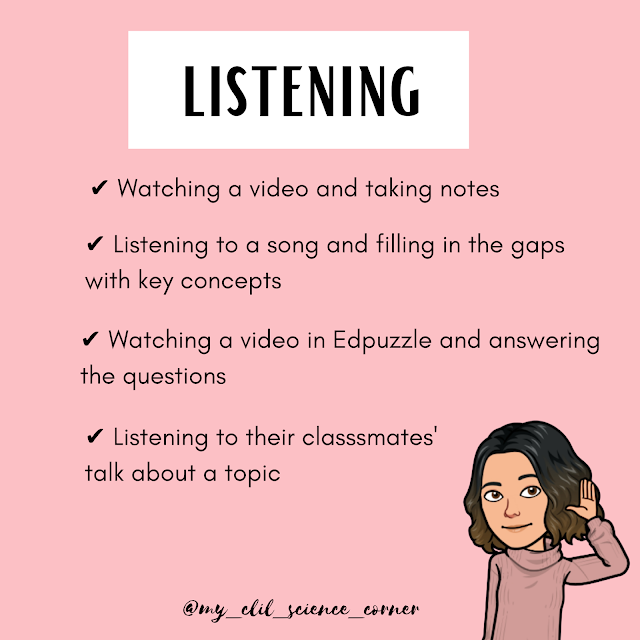THE FOUR SKILLS IN CLIL
Hi teachers!
How are you doing?💖
Today I would like to ask you a question: do you bear in mind the 4 skills (listening, speaking, reading and writing) when planning your CLIL units or projects? I try to do so, even if sometimes it is a bit tricky.
From my point of view, it is highly important that our students have time to practise the 4 skills in their CLIL class because, in fact, they are using a language to learn in a similar way they would if they were learning content in L1. Whenever they are learning contents from any subject in L1 they are also using the 4 skills: maybe they are watching a video and they are listening to information they need for a purpose (listening) ; they are discussing a topic (speaking); they are searching for information in books or on internet (reading) or they are writing a report (writing). So, why not practising the 4 skills in our CLIL lessons?
Would you like to find out what activities I use in my CLIL lessons to practise the 4 skills? Good! Keep reading👇
Remember:
► The MOST important is that students realise they are using the language for a PURPOSE, so the activities should be set in a CONTEXT and should be MEANINGFUL for the kids. These activities can always have an audience or to be useful for the school.
► SCAFFOLDING (click here to read the post about Scaffolding) and MODELLING by the teacher is highly recommended. Our students are learning content and language. They need this support to improve and to make progress.
Now tell me, how do you plan the 4 skills in your CLIL lessons? I will be very happy to read your experience.











English as a subject helps students improve their communication, writing, and analytical skills, but many still struggle with grammar, literature analysis, and academic writing. Getting the right guidance can make a huge difference in understanding complex texts and improving clarity. The english assignment help service offers expert support, helping students develop stronger writing skills and complete assignments with confidence. It’s a great resource for anyone looking to score higher in English coursework.
ReplyDelete